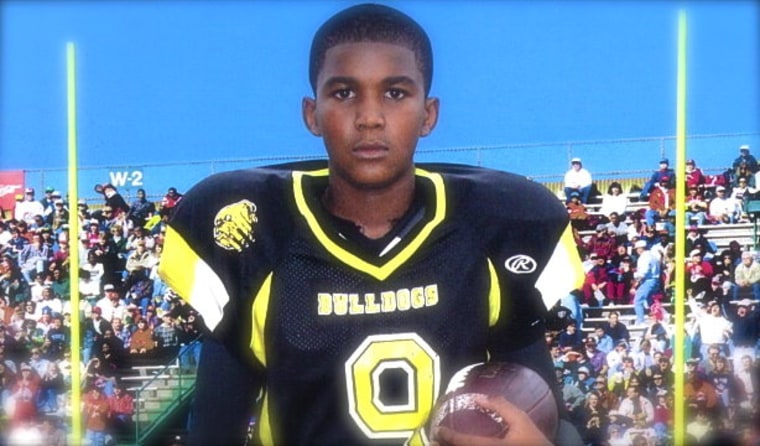Florida college students are rallying today outside of the Seminole County courthouse, issuing a simple demand: "Arrest Zimmerman now." They're talking about George Zimmerman, the Sanford, FL neighborhood-watch captain who killed South Florida teenager Trayvon Martin on February 26 --and remains a free man three weeks later, despite the undisputed fact that he fired the shot that killed the 17-year-old (pictured above).
The key question in all of this is, why did he do it? The 250-pound Zimmerman alleges that he acted in self-defense after a physical confrontation with the 140-pound Trayvon ensued. One wonders how it even got to that, seeing as Trayvon appeared to be minding his own business, walking back to the home of his father's girlfriend with his newly-purchased Skittles and Arizona Iced Tea?
All Zimmerman had were his suspicions, as voiced in a 911 call that he made upon spotting Trayvon (caution for an expletive):
"Hey, we've had some break-ins in my neighborhood, and there's a real suspicious guy ... This guy looks like he's up to no good or he's on drugs or something. It's raining, and he's just walking around looking about ... Now he's coming towards me. He's got his hand in his waistband. And he's a black male ... Something's wrong with him. Yup, he's coming to check me out. He's got something in his hands. I don't know what his deal is ... These a**holes, they always get away.
Some facts of the case are still in question: why Zimmerman continued to pursue Trayvon after being told by the 911 dispatcher to not do so; what happened in the physical confrontation, and what provoked it; the shooter's mental stability; and the viability of his "self-defense" defense in Florida. Remember, that's where then-Governor Jeb Bush signed the "Stand Your Ground" law in 2005. It just so happens that rates of "justifiable homicides" in the state skyrocketed in subsequent years.
Per the Orlando Sentinel's recent primer on the law, the director of the Florida Coalition to Stop Gun Violence deems "Stand Your Ground" to be "a right to commit murder":
"I predict this case is not going to be charged — it's going to be dismissed," he said of the case against Zimmerman. "Almost every case between two individuals where one was armed and the other was not is dismissed."
On Saturday, Melissa called out laws like Stand Your Ground that open the door for "modern-day vigilantism," saying that "too many young black men are losing their lives to mistaken identity and overzealous assumptions about their criminal intent." Can anyone argue that that assessment doesn't apply in Trayvon's case? Above all, what cannot be questioned is that Zimmerman's evaluation was incorrect. Trayvon wasn't "up to no good," he was walking home. Nor was he "on drugs or something." He reportedly wasn't doing anything fitting the Merriam-Webster definition of "suspicious."
But as Trayvon's mother alluded to in her interview this morning on "Today," black skin can define "suspicious" all by itself.
One could argue that this applies also in Wendell Allen's instance. The 20-year-old former high school basketball star was shot and killed in his mother's home on March 7 when New Orleans police arrived with a narcotics search warrant. He was unarmed. Similar to Trayvon's case, local residents (like Allen's grandmother) are outraged that the details about Allen's death have been sparse, and no arrests have been made.
Times-Picayune columnist Jarvis DeBerry weighed in today on both deaths with a fascinating column that traces an all-too-familiar story:
The humiliation in having to publicly beg that your loved one's killer be handcuffed! How can you have faith that justice will prevail? You're not even convinced the justice system cares about the loved one you lost -- at least not in comparison with the known assailant. That is what the family of Trayvon Martin is going through in Florida and what Wendell Allen's family must fear they'll endure here in New Orleans.
It's what too many families have had to endure -- families like Sean Bell's, or Martin Lee Anderson's, and too many more. As DeBerry puts it, the message being sent is, "Black boys, you enjoy no protection. You can be stopped for nothing, killed for nothing and then be blamed for your demise." (Black girls, too.)
DeBerry statement may sound cynical to some. But how, in the wake of Trayvon Martin and Wendell Allen, can we afford to not take it seriously? In fact, it echoes what Melissa said in her coda to Saturday's segment, which she concluded by saying:
When innocent children are killed, when their parents are left to wonder if their children's lives matter at all, at least we can remember their names.
Indeed. That is just about the least we can do.
